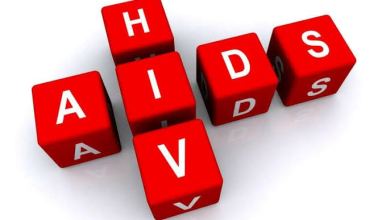“World HIV/AIDS Day: 1.9 Million Nigerians Affected”

As the world observes this year’s Human Immunodeficiency Virus (HIV) and Acquired Immunodeficiency Syndrome (AIDS) Day on Sunday, December 1,
the Chief Social Welfare Officer at Lagos Island Maternity Hospital, Mary Olayemi, said Nigerians should abstain from careless and unprotected sexual intercourse.
She advised Nigerians to constantly make efforts to know their HIV status by getting tested every three months.
“Citizens who are HIV reactive should desist from spreading the virus to others intentionally. I will also advise Nigerians to stop sharing sharp objects like razor blades, needles and cuticles, among others,” Olayemi said.
She urged Nigerians who have information about how the virus can be spread and how it can be prevented to directly or indirectly share it with other citizens who are less informed.
“The reactive citizens who are on medication should make sure they take the drugs regularly as instructed by their caregivers or doctors,” she advised.
She said one of the prevention strategies of HIV is to practice safe sexual intercourse by making use of condoms consistently and correctly.
Giving more prevention tips, Olayemi said: “Limit sexual partners, avoid unprotected sexual intercourse, get tested to know your status. There is a need to encourage partners to get tested.
To prevent mother to child transmission, pregnant women should get tested. Take antiretroviral therapy (ART) if positive. Avoid sharing needles, use sterile needles and syringes. Avoid sharing personal care items.
PAUL ADUNWOKE examines issues around the disease and the global cum Nigeria’s efforts to roll back its spread with emphasis on increasing more advocacy for prevention and effective antiretroviral treatment of infected persons devoid of stigma
Statistics have shown that about 1.9 million Nigerians are currently living with HIV/AIDS. According to the World Health Organisation (WHO), HIV remains a major global public health issue, having claimed an estimated 42.3 million lives to date. Yet, its transmission is ongoing in all countries of the world.
The global health body also revealed that an estimated 39.9 million people were living with HIV at the end of 2023, 65 per cent of whom are in the WHO African Region.
In Nigeria, Benue State has the highest HIV prevalence, followed by Rivers, Akwa Ibom, Edo, and Taraba states.
Records also show that funding for HIV dropped by five per cent from 2022 to 2023, and by 7.9 per cent between 2020 and 2023.
WHO Regional Director for Africa, Dr. Matshidiso Moeti, noted that in 2023, an estimated 630,000 people died from HIV related causes while an estimated 1.3 million people acquired HIV.
She explained that there is no cure for HIV infection. However, with access to effective HIV prevention, diagnosis, treatment and care, including for opportunistic infections, HIV infection has become a manageable chronic health condition, enabling people living with it to lead long and healthy lives.
Moeti stated that WHO, the Global Fund and The Joint United Nations Programme on HIV/AIDS (UNAIDS) all have global HIV strategies that are aligned with the Sustainable Development Goals (SDG) target 3.3 of ending the HIV epidemic by 2030.
She said by 2025, 95 per cent of all people living with HIV should have a diagnosis, 95 per cent of whom should be taking lifesaving antiretroviral treatment, and 95 per cent of people living with HIV on treatment should achieve a suppressed viral load for the benefit of the person’s health and for reducing onward HIV transmission.
She noted that in 2023, these percentages were 86 per cent, 89 per cent, and 93 per cent respectively.
“In 2023, of all people living with HIV, 86 per cent knew their status, 77 per cent were receiving antiretroviral therapy and 72 per cent had suppressed viral loads,” she said.
HIV is a virus that weakens the body’s immune system, making it harder to fight infections and some cancers. The most advanced stage of HIV is AIDS, which can develop over two to 15 years.
To curb the spread of the disease, the Chief Executive Officer (CEO), Lagos State AIDS Control Agency (LSACA), Dr. Folakemi Animashaun, explained that the agency has introduced free HIV screening initiative as part of efforts to promote public health, offering convenient access to HIV testing and support services in the state. Animashaun added that the state remains committed to improving access to health care services including free screening and counselling exercises for the residents of the state.
She noted that the state has intensified efforts in upscaling its anti-retroviral therapy (ART), public awareness and sensitisation, free HIV testing and counselling, community outreach and youth focused programmes. She also revealed that the state has also invested in research and data collection for a better understanding of the trends and demographics of HIV/AIDS in the state.
Animashaun commended residents of Lagos State for turning up for screenings in recent times, emphasising that HIV testing is essential for a healthy and productive life.
She stressed that the positive response from residents reflects a growing commitment to health and preventative measures in the fight against HIV.
“The fight against HIV through the free screening initiative not only serves to increase awareness about HIV but also fosters responsible practices within the community to reduce the risk of transmission,” Animashaun said.
The CEO explained further that the screening exercise will provide valuable resources and support for residents regarding HIV awareness and prevention, adding that the exercise will not only raise awareness about HIV but also encourage responsible practices to reduce community transmission of the virus.
The CEO stated that Lagos State is taking a significant step towards combating HIV/AIDS by developing a comprehensive HIV Action Plan for disease prevention.
According to her, in line with the agency’s commitment to the prevention and control of HIV in the state, LSACA has partnered with the United Nations Population Fund (UNFPA) to advance the state’s HIV prevention efforts.
“Together, we have embarked on the development of the year 2025 to 2027 HIV Action Response Plan (HARP). This comprehensive plan was informed by findings from an earlier assessment using the HIV Prevention System Assessment Tool (PSAT), which identified strategic gaps,” she said.
While commending UNFPA for collaborating with the state government, the CEO noted that the fight against HIV is an ongoing battle and can only be won through collaborative efforts and strategic planning.
She emphasised the state’s unwavering commitment to improving access to healthcare services, highlighting the importance of increased awareness campaigns and the expansion of HIV testing and counselling centres across the state.
She noted that the state is dedicated to curbing the spread of the virus by ensuring that all residents have access to the necessary resources for prevention, testing, and treatment.
The CEO advised all residents of Lagos State to take responsibility for their health and well-being as getting tested for HIV is a crucial step in maintaining a healthy and productive life.
“I urge everyone to take advantage of this opportunity and prioritise their health. I like to take this opportunity to encourage all residents to take advantage of the free screening exercise being offered.”On her part.












